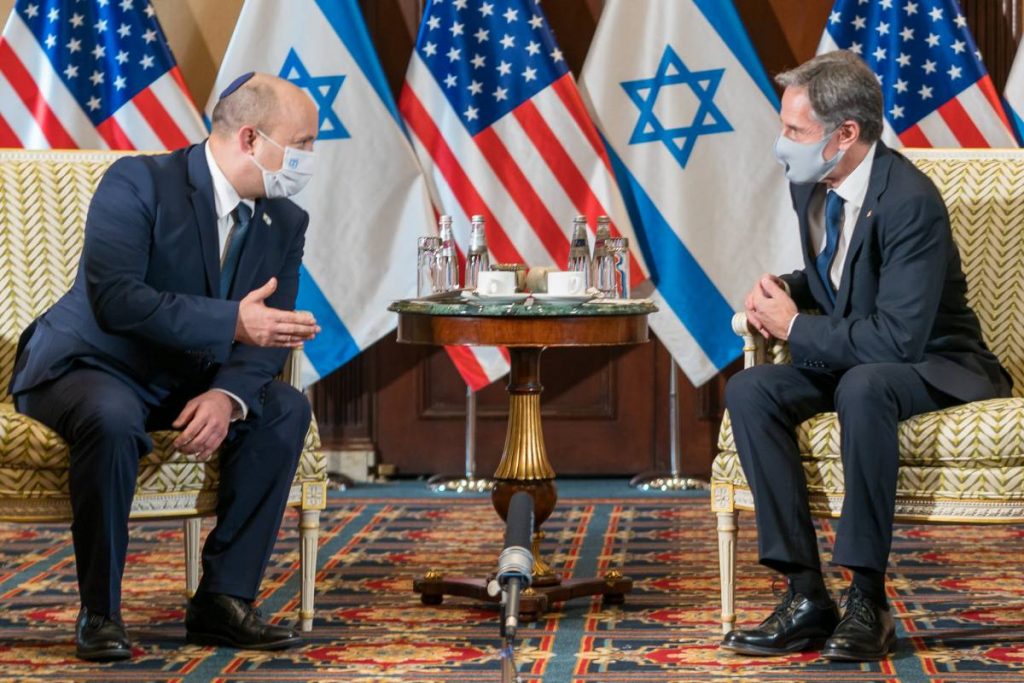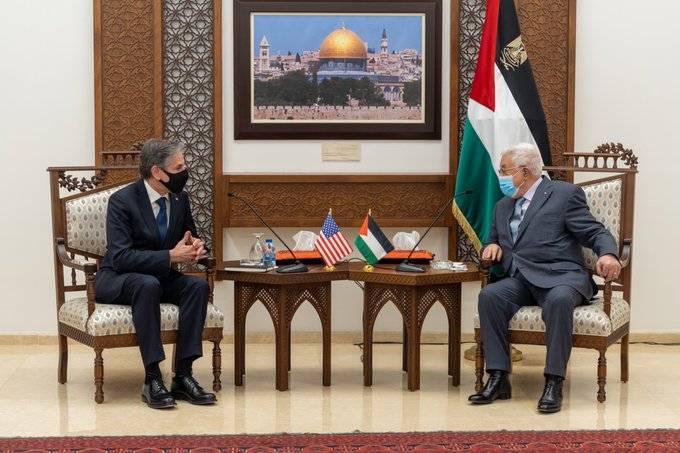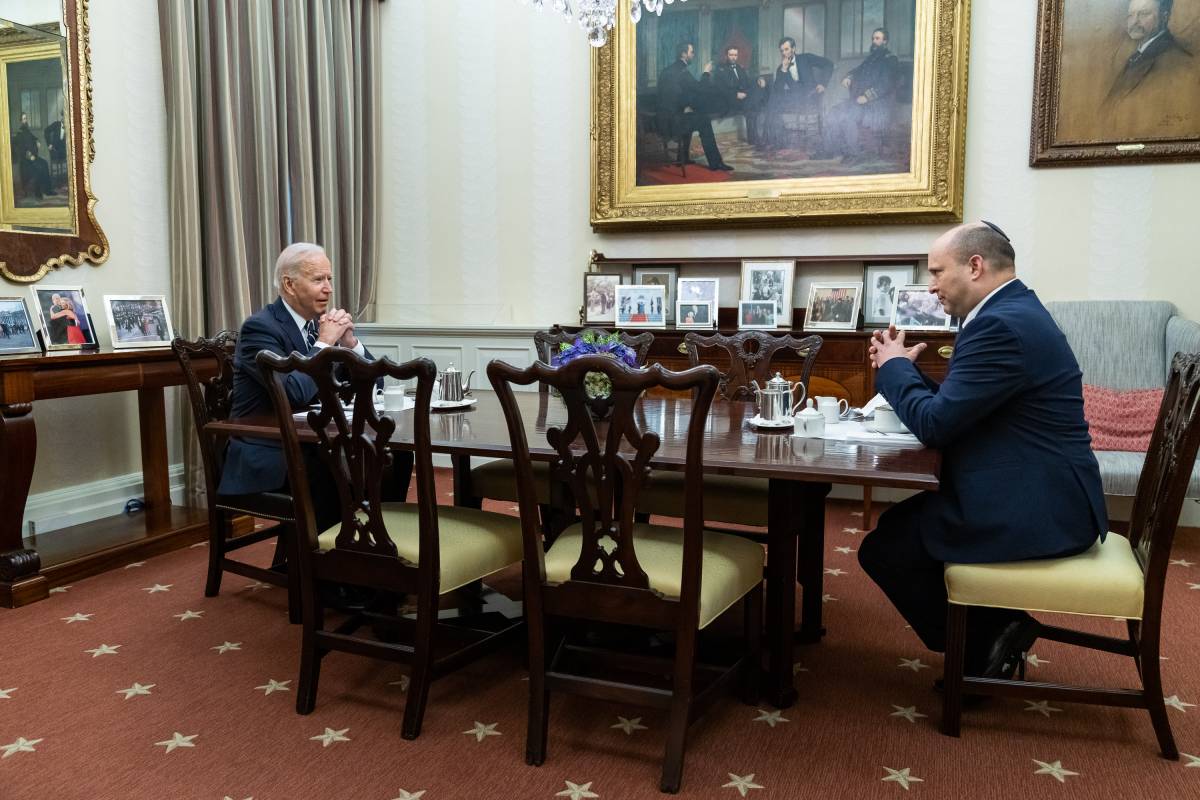It takes bold US leadership to effect a change in the Israeli-Palestinian discourse, and Biden may well be the right president at the right time that will ultimately serve the Israelis as much if not more than the Palestinians, writes Dr Alon Ben-Meir
The summit between President Biden and Prime Minister Bennett came at a time of tremendous political complications and uncertainty that occupied both leaders. Despite the turmoil, they appear to have agreed upon a few important issues in essence: halting the building of new housing units and eviction of Palestinians from their homes in the West Bank, maintaining the status quo, and collaborating on addressing the Iranian nuclear program. Neither sought to delve into the Israeli-Palestinian conflict, which Bennett wants only to manage and Biden does not want to be sunk into regardless of the mid and long-term dangerous implications of doing next to nothing.
Instead, both leaders wanted to focus on establishing a personal rapport and demonstrate the enduring strength of the American-Israeli friendship, while agreeing to fully consult in dealing with the Iranian nuclear threat. In all, both were happy with the outcome of the meeting by achieving in principle what they set out to realize.
It would have certainly been premature for Bennett and Biden to discuss a new Israeli-Palestinian peace negotiation. The fact however that they have not laid down a path that could at least lead to such eventuality is extremely troublesome. This will dangerously erode further the conditions on the ground, harden the position of the extremists on both sides, and make the prospect of a two-state solution ever more intractable and costly.

The fact that the Israeli coalition government agreed from the onset not to tackle the conflict with the Palestinians was a bizarre agreement totally inconsistent with the inescapable need to find a peaceful solution to the conflict. President Biden’s strategic omission not to publicly declare his traditional support for two states during his press conference with Bennett was deeply disturbing to senior Palestinian officials with whom I spoke. This was coupled with Bennett’s statement to the New York Times only two days before his meeting with Biden that he opposes the establishment of a Palestinian state. His statement only reinforced the Palestinians’ belief that Israel will not allow the establishment of a Palestinian state, and they are looking for the Biden administration to change the course of the conflict.
ALSO READ: Biden meets Ukrainian president over security issues, ties
Given that Biden strongly supports the two-state solution, he can take several unilateral measures to convey to both Israelis and Palestinians where his administration stands. Such measures will certainly be welcomed by the Palestinians and irk the Israelis—and to those who argue that this is not the right time to do so, then when is the right time? After 73 years, this will be a good time as any.
It takes however bold US leadership to effect a change, and Biden may well be the right president at the right time that will ultimately serve the Israelis as much if not more than the Palestinians. There are specific steps that Biden can take that will help lay the groundwork for a future substantive peace negotiation that could lead to a resolution to the conflict.

Reestablish the PLO mission in DC
President Biden should allow the Palestinian Authority to reestablish its mission in DC. This would immediately open a channel of communication which is central to the development of a dialogue between the US and the PA. This will also send a clear signal to the Palestinians that the new administration is truly keen on turning the page and starting a new dialogue without prejudices.
Reopen the American Consulate in Jerusalem
Reopening the American Consulate in Jerusalem, particularly reestablishing it in East Jerusalem, will serve as a point of contact for Palestinians, and will also send a message to the Palestinian Authority that the future of Jerusalem has not yet been settled, which is consistent with Trump’s Peace to Prosperity plan that left the final borders of Jerusalem to be determined by agreement from both sides. Opening the consulate will allow Palestinians to be in more regular contact with the United States and open a forum for exchanging views, but will also restore Palestinian confidence in the US under Biden and allow him to play a more constructive role.

Resume financial aid
It was essential that the Biden administration restored financial aid to the Palestinians, which had been suspended by Trump. Given that aid has been abused in the past, however, it should have clear guidelines on its use, with monitoring from a US observer to ensure that the money is spent on the programs and projects for which it is intended. The continuing financial aid will not only help the Palestinian Authority address its acute financial shortages but allow it to invest in some development projects that can provide jobs especially to the youth, of whom more than 30 percent are unemployed.
Prohibit territorial annexation and settlement expansion
Biden should make it clear to Bennett that Israel must not annex any Palestinian territories and must temporarily freeze the expansion of settlements. In addition, he should insist that Israel not legalize unauthorized settlements and refrain from evicting any Palestinians, especially from East Jerusalem. Taken together, the Israelis’ adherence to these requirements will help foster a calm atmosphere which is critical to a process of reconciliation that includes government-to-government and people-to-people interactions to foster trust and confidence that a better future for the Palestinians lays ahead.

New parliamentary and presidential elections
Given that no election has been held by the Palestinians in over 15 years, Biden should demand that the Palestinian Authority establish an iron clad date for general elections. The election should be monitored by UN representatives to ensure that it is free and fair, and all those seeking high office must commit themselves to accept the outcome of the elections. The Palestinians are in desperate need of new leadership untainted by corruption and not wedded to prior hard positions that left no room for compromises.
Reciprocity by the Palestinians
In return for these measures that considerably benefit the Palestinians, Biden should require the Palestinians to take numerous steps to demonstrate their commitment to a peaceful solution. This includes ending any and all forms of incitement against Israel, fully collaborating with Israel on all security matters, and providing no protection to any violent Palestinian extremist.
It is understandable that Biden is preoccupied with the raging pandemic, Iran’s looming nuclear threat, and daily confrontations with Republicans over climate change, voting rights, and sweeping social programs, to name a few issues. Nevertheless, he can take the above modest measures to dramatically change the course of the conflict for the sake of bringing a gradual end to the longest conflict in modern times.
As the most seasoned president, Biden understands the pitfalls of a long and protracted conflict. The war in Afghanistan provided him a glaring and painful example of how much can go wrong, yet he was still right and courageous to finally end it. Biden is right not to push for the resumption of Israeli-Palestinian peace talks, but he can demonstrate the same courage and leadership to change the course of the conflict that will eventually lead to a peaceful coexistence.
(Dr Alon Ben-Meir is a professor of international relations at the Center for Global Affairs at NYU. He teaches courses on international negotiation and Middle Eastern studies.)

Leave a Reply